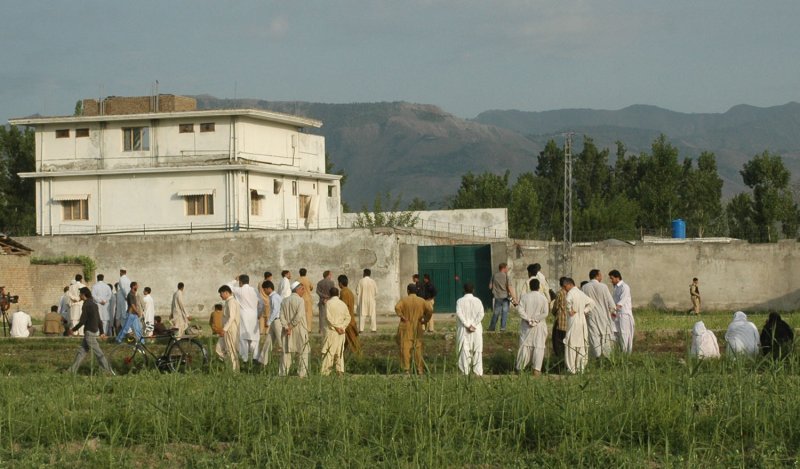A view of Osama bin Laden's compound in Abbottabad, Pakistan, shows local and international media along with local residents gathered in front of the compound on May 5, 2011, after a U.S. military raid late which ended with the death of the al-Qaida leader bin Laden and others inside. UPI/Sajjad Ali Qureshi |
License Photo
ARLINGTON, Va., July 27 (UPI) -- The killing of Osama bin Laden and seven years of CIA drone strikes have pushed al-Qaida to the brink of collapse, U.S. counterterrorism officials say.
Terrorism against the United States and Americans will likely continue, but the organization, based in Pakistan, that carried out the Sept. 11, 2001, terrorist attacks could soon be extinguished, officials told The Washington Post.
The officials cited classified intelligence reports and closed-door Capitol Hill briefings from the CIA, the National Counterterrorism Center and other agencies, the Post said.
"There is a swagger within the community right now for good reason," Sen. Saxby Chambliss of Georgia, the ranking Republican on the Senate intelligence committee, told the newspaper.
Al-Qaida in the Arabian Peninsula, the jihadist organization's Yemeni and Saudi Arabian offshoot, remains strong and is viewed as a greater counterterrorism challenge than al-Qaida's traditional base, Chambliss said.
President Barack Obama has steadily expanded a clandestine U.S. campaign against the Yemen-Saudi group, despite setbacks.
"But when it comes to al-Qaida [in Pakistan], we have made the kind of strides that we need to make to be in a position of thinking we can win," Chambliss told the Post.
Al-Qaida could still rally, U.S. officials said, but bin Laden's death in a U.S. commando raid May 2 in Pakistan was a turning point -- in part because bin Laden had still managed the terrorism network and kept it focused on mounting anti-U.S. attacks, the officials told the Post.
His charisma was also key to al-Qaida's strength, "brand" and the proliferation of related groups around the world, they said.
His death, combined with continued U.S. drone strikes and other covert actions could, soon render the militant Islamist group "largely incapable" of mass-casualty attacks against the United States, an official told the Post.
Defense Secretary Leon Panetta declared July 9 during an Afghanistan visit, "We're within reach of strategically defeating al-Qaida.
"The key is that, having gotten bin Laden, we've now identified some of the key leadership within al-Qaida, both in Pakistan as well as in Yemen and other areas," he said.
"If we can be successful at going after them, I think we can really undermine their ability to do any kind of planning, to be able to conduct any kind of attack" on the United States. "That's why I think it's within reach," he said. "Is it going to take some more work? You bet it is. But I think it's within reach."















